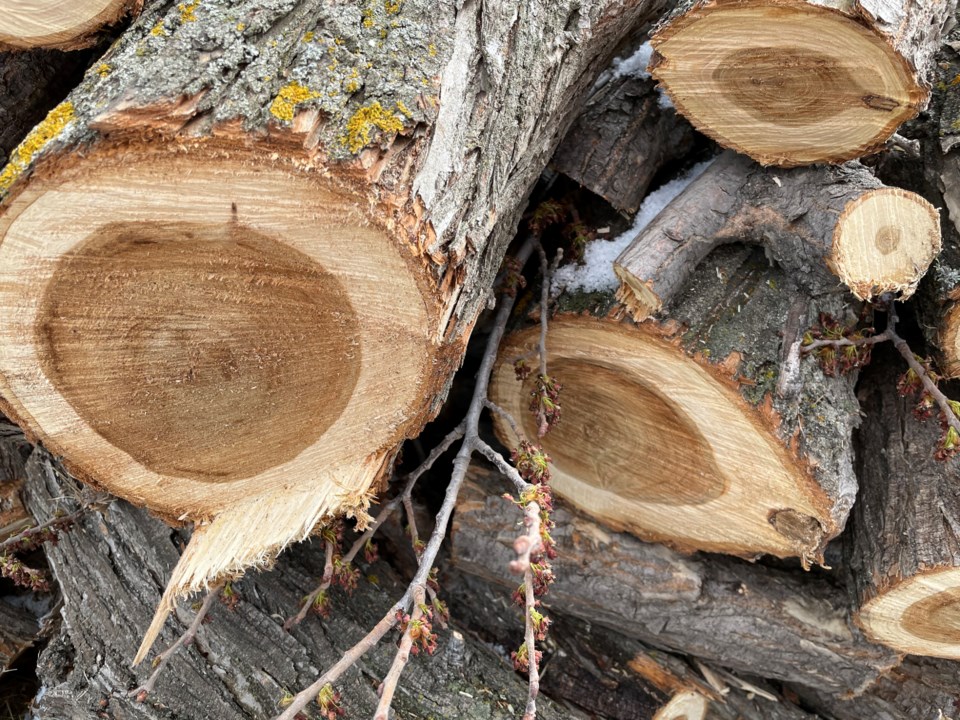SASKATOON — The City of Saskatoon offers residents the opportunity to dispose of elm wood at the landfill at no cost (for loads up to 1,000 kilograms) through to the end of the year.
This initiative aims to encourage the prompt and proper disposal of elm wood, reducing the risk of disease transmission to healthy elm trees. The city wants to remind people that an elm pruning ban is in place each year from April 1 until Aug. 31; however, this new initiative means that any elm wood that has been removed, previously been cut, has fallen or was intended as firewood can be disposed of for free.
“Elm trees hold a special place in our urban landscape, providing shade, enhancing aesthetics, and supporting local biodiversity,” says Konrad Andre, Parks Operations Manager.
“However, they face a serious threat from diseases like Dutch Elm Disease. To help manage this issue effectively and limit the spread, it is crucial to ensure proper disposal of all elm wood,”
The city ran a free elm wood disposal pilot project at the Landfill in October 2023, accepting a total of 866 loads during the month-long pilot. Building on this positive community response, city council approved the elimination of residential tipping fees on elm wood for the remainder of 2024 to encourage proper disposal.
This means that residents may dispose of elm wood loads under 1,000 kg, including branches, logs and other elm debris, at the landfill during regular operating hours at no cost. This program is limited to residents of the City of Saskatoon only due to provincial regulations that prohibit transporting elm wood across municipal borders. Loads must consist of 100 per cent elm wood to qualify. The Saskatoon Regional Waste Management Centre (Landfill) is located along Valley Road, south of 11th Street.
Commercial customers will continue to be charged regular fees and engagement with this sector is planned for later in 2024.
“By taking advantage of this free elm wood disposal pilot program, residents can play an active role in protecting our urban canopy and preserving the natural beauty of our community,” says Andre. “Timely disposal of elm wood can significantly reduce the risk of Dutch Elm Disease and support the health of our elm tree population.”
What is DED?
DED is a serious fungal disease that impacts an elm tree’s water and nutrient conducting system, which eventually causes the tree to die. In Saskatoon, elms make up 25 per cent of the public urban forest. Four positive cases of DED were identified in Saskatoon neighbourhoods in 2023.
How is DED spread?
In Saskatchewan, the disease is spread by several species of elm bark beetles. These beetles can fly farther than two kilometres in search of elm trees and are attracted to the scent of pruned or damaged trees and firewood. The DED fungus has tiny spores that stick to the bodies of bark beetles and they can carry these spores and infect other elm trees. The fungus can also be spread by infected pruning tools.
You can help prevent DED by:
- Never storing elm wood or branches. Don’t buy or take elm wood from anyone and don’t burn it. Elm firewood is the best habitat for bark beetles.
- Disposing of elm wood at the Saskatoon Regional Waste Management Centre (Landfill). Do not take elm to the compost depot or put it in your green bin. Dispose of it immediately, even if it is during the provincial pruning ban.
- Reporting dead or dying elm trees or branches to the city.
How to identify and report unhealthy elm trees and firewood
American elm trees with DED may start showing symptoms as early as June. Typically, the leaves will start to wilt and turn yellow, then curl and turn brown. If you suspect an unhealthy elm tree or are unsure of what type of firewood you have, take a photo and complete the online form at saskatoon.ca/dutchelmdisease or call Urban Forestry at 306-975-2890.
For more information on DED, visit saskatoon.ca/dutchelmdisease.



